The Tory leadership contest is a fork-in-the-road moment for the party
As ballot papers go out to members, Andrew Grice looks at the race so far and assesses who seems to be heading for 10 Downing Street


Sometimes party leadership elections do not offer much real choice – rather, they are about shades of red or blue, with debates conducted in code in the hope of limiting public divisions for the sake of the party.
The contest between Liz Truss and Rishi Sunak is not one of these elections. Two people who sat around the same cabinet table for three years until only a few weeks ago, have set out two very different visions for the country, and do not pretend otherwise. The surprisingly strong blue-on-blue attacks have alarmed senior Conservatives, who have appealed to both camps to tone down their language, warning they risk trashing the party’s brand and its record in power in the past 12 years. It’s probably too late to prevent such damage.
This is a fork in the road moment for the Tories because the fundamental division between the two would-be prime ministers is about economic policy. Sunak offers fiscal responsibility, a tablet of stone for the party. While insisting he is a “low-tax Conservative” his “sound money” principle means he would delay tax cuts until the dragon of inflation has been slain. He has called it “immoral” to increase borrowing for tax cuts as this would saddle future generations with more debt.
In contrast, Truss was quick to promise tax cuts “from day one” to tackle the cost of living crisis and kickstart the economic growth she claims has been woefully lacking during 20 years of “Treasury orthodoxy” (including, of course, two and a half years with Sunak as chancellor). She argues it was “morally wrong” for him to raise national insurance contributions during a living standards emergency.
Behind the daily exchange of fire on tax lies a deeper question about the Tories’ post-Brexit identity, which Boris Johnson dodged: should the party adopt the hardline Brexiteers’ vision of a low-tax, low-regulation UK with a smaller state, dubbed “Singapore-on-Thames”? Or is this incompatible with the higher public spending needed to level up the country and meet the demands of the “red wall” voters Johnson captured in 2019? Truss, who is more ideological, leans to the former, while Sunak is more pragmatic, defending his decision to increase tax to fund health and social care.
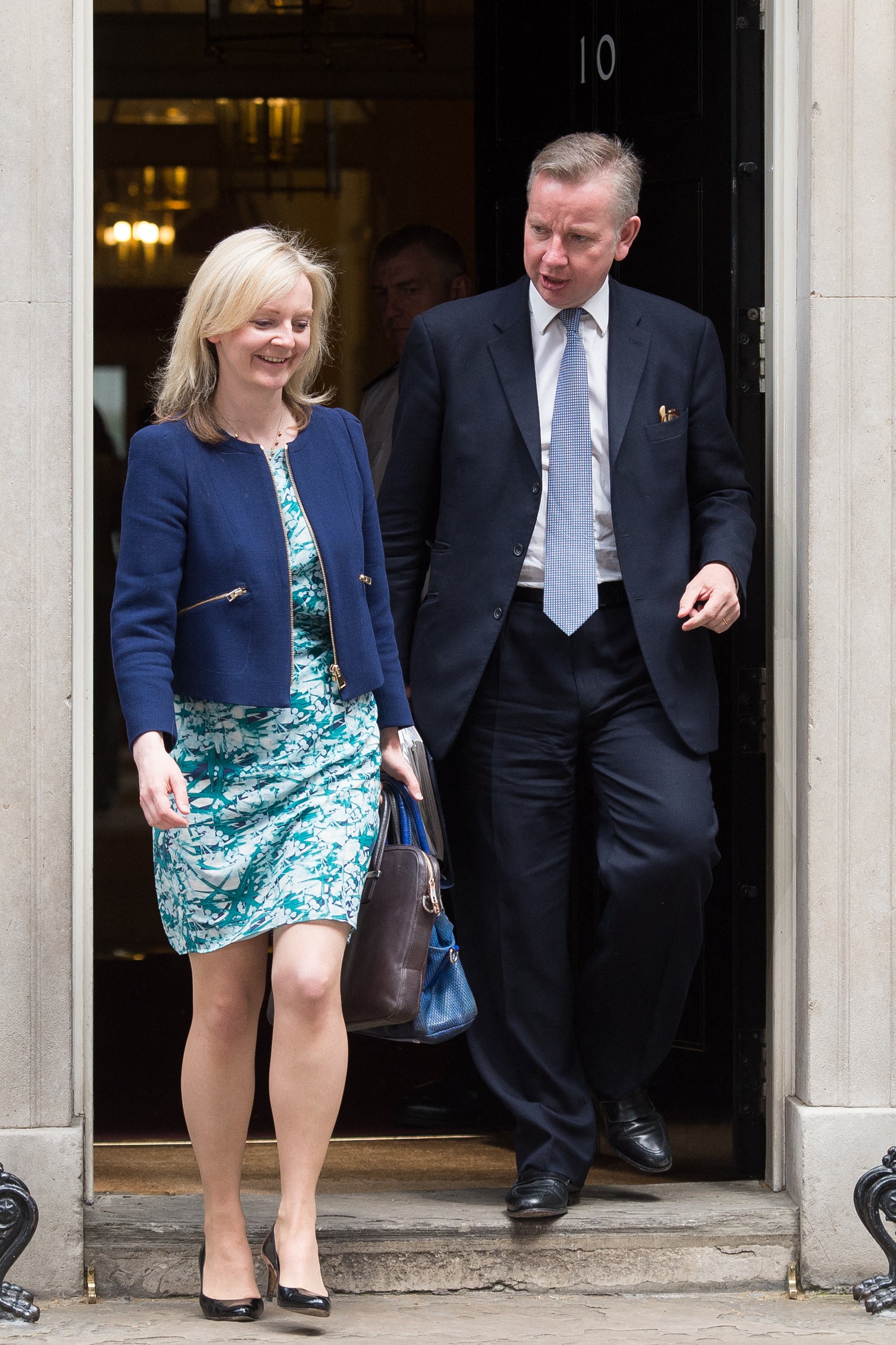
Truss, the longest continuously serving cabinet minister, worked under David Cameron, Theresa May and Johnson without making a big mark in any of her five posts. Although she joined the cabinet before Sunak became an MP in 2015, she has managed to cast herself as “the insurgent” and “change candidate” and portray Sunak as the defender of the status quo. Yet Truss is also the “continuity Johnson” candidate, which works in her favour among those Tory members angry their prime minister was pushed out. Although Sunak did not mount a “ruthless coup,” as the Truss-backer Nadine Dorries claimed, the “betrayal” label hangs heavily around his neck.
The foreign secretary has neutralised one of her weaknesses: she backed Remain in the 2016 referendum – fellow ministers say she judged it would be the winning side – but now says she is the candidate who has made the most of Brexit’s opportunities by securing trade deals around the world. It doesn’t seem to matter to Tory activists that most were cut-and-paste jobs of agreements the UK enjoyed as an EU member. Truss even dared to accuse Sunak of reprising Remain’s “project fear” campaign in 2016 when he warned her tax cuts would push up inflation and interest rates.
Truss’s boosterism echoes Johnson’s bouncy optimism. However, being “continuity Boris” didn’t make things easy for her in the voting rounds among Tory MPs, when there was an appetite for the real change offered by Penny Mordaunt, Kemi Badenoch and Tom Tugendhat. Before the contest began, several Tories told me they were confident of preventing her reaching the shortlist of two chosen by MPs from which grassroots members decide the new leader. As one put it: “If she gets on the shortlist, she will win” – a prophecy that now seems to be coming true. She survived the “stop Truss” move at Westminster, with the help of an “anyone but Rishi” campaign by Johnson allies who (unfairly) blame Sunak for his downfall, and eventually managed to unite right-wing MPs.
Some polls suggest Sunak is more likely to win back 2019 Tory voters who no longer support the party, but the picture is now more mixed as Truss becomes better known to the public
Truss’ decision to remain as foreign secretary when Sunak quit as chancellor was shrewd; she knew she would sooner or later need to woo Tory members. Loyalty is highly prized in the party; at the two hustings for members so far, Tory activists accused Sunak of disloyalty. One survey suggests one in four Tory members want Johnson on the ballot paper and one in three would vote for him if he were.
After hesitant, nervous performances in the early debates with other candidates, Truss has visibly grown in confidence since making the shootout, and now undoubtedly has the crucial ingredient of momentum. Success breeds success and, like her in the Brexit referendum, politicians want to back the winning horse – in the current contest, to enhance their chances of a cabinet job. Senior Tories who sat on the fence until they could sense the way the wind was blowing have endorsed Truss, including Ben Wallace, Nadhim Zahawi, Brandon Lewis, Mordaunt, who came third in the contest, and Tugendhat, a surprising backer given his “one nation” credentials. Sunak won some early cabinet support, but Truss now has twice as many cabinet backers as him.
As the run-off began, one Sunak supporter candidly listed his weaknesses to me as “being too slick; being rich; the non-dom row [his wife Akshata Murthy’s previous tax status], his Partygate fine; his resignation and his tax rise.” Tax has indeed proved a millstone – notably, his breach of the 2019 Tory manifesto promise not to raise national insurance, as Sunak did in April, which Truss has exploited and pledged to reverse. The pro-Sunak MP added: “The most important question is whether you can imagine this person as prime minister. Rishi passes that test. I don’t think Liz does.”
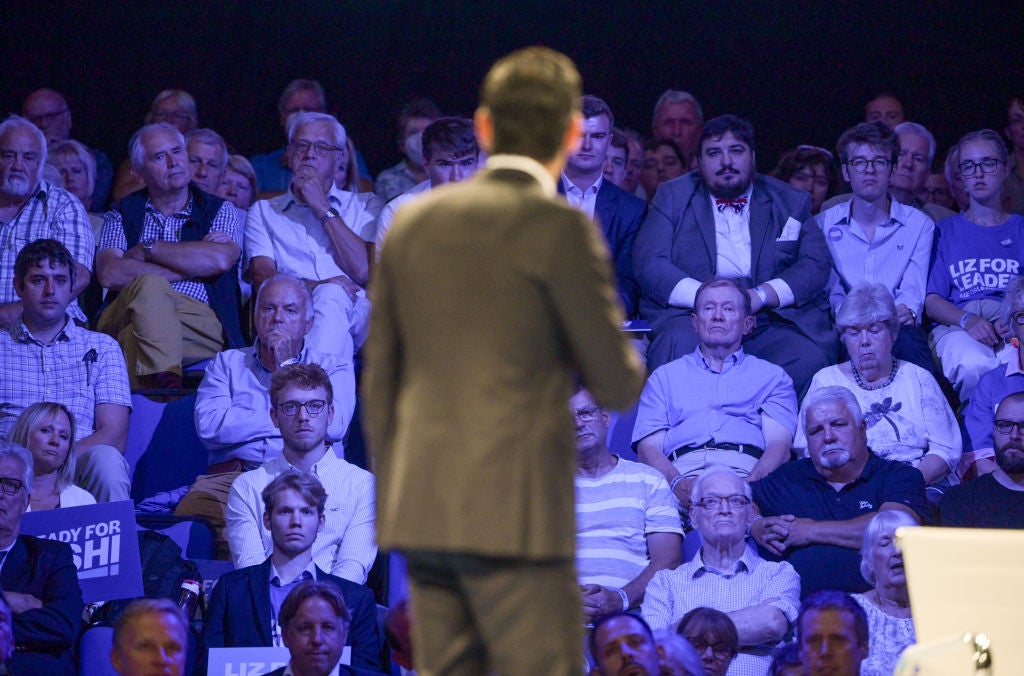
In the initial debates, Sunak certainly looked more prime ministerial than his opponent and had the better of their fierce clashes on the economy; he was more comfortable on his natural territory than Truss. He was banking on landing some big blows in last week’s BBC debate with Truss but was too aggressive, repeatedly interrupting her. In the sharpest exchanges of the contest, a Truss ally attacked Sunak as “not fit for office,” “aggressive mansplaining” and “shouty private school behaviour”. In an attempt to lower the temperature, both candidates suggested they would serve in each other’s cabinet if they lost. But that is far from certain: whoever becomes prime minister will hold all the cards and might offer a less senior job than the losing candidate would accept.
The Sunak camp hoped his other trump card would be opinion polls showing he would be much more likely to win the Tories an unprecedented fifth term in power than his rival. Some polls suggest Sunak is more likely to win back 2019 Tory voters who no longer support the party, but the picture is now more mixed as Truss becomes better known to the public.
Crucially, this election is about character and style as well as electability. As one senior Tory who is backing Truss puts it: “For the members, it is a choice between the head and the heart. A lot of heads will be with Rishi, but Liz is winning their hearts.” Polls of members suggest hearts are overruling heads. The first one put Truss 24 points ahead but the latest shows only a five-point gap and a survey of Tory councillors suggests a tight race. Team Sunak insists that Truss’ support is soft, and many members are undecided. Its hopes rest on its “ground war,” notably in the “blue wall” in the south, where local Tory associations often have more members than in the “red wall.”
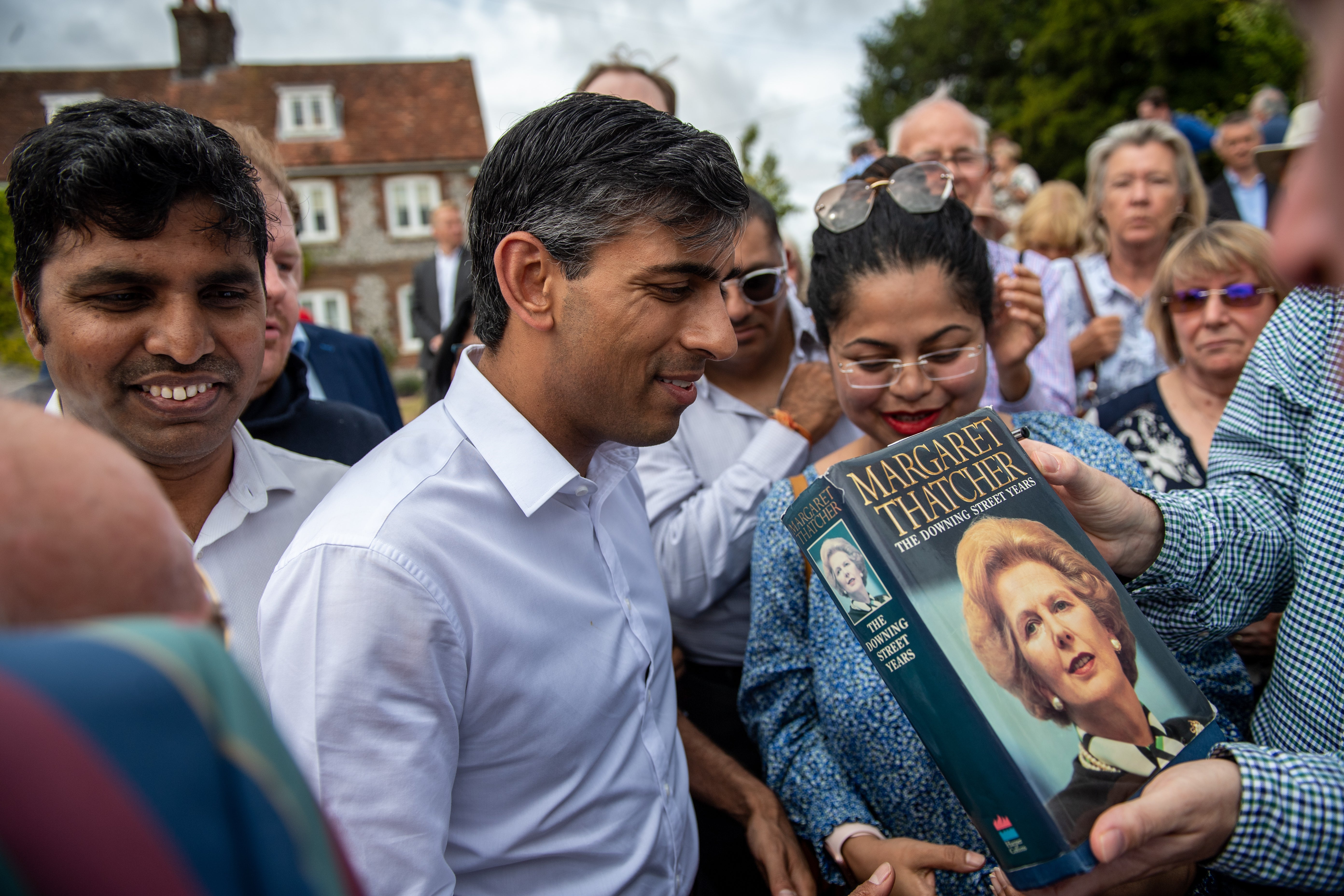
Sunak’s fiscal conservatism has proved a less potent pitch than his allies expected at the start of the contest. He has a stronger claim to be the heir to Margaret Thatcher than Truss; the party’s omnipresent heroine raised taxes, reduced borrowing and curbed inflation before cutting taxes.
Although some Tory MPs grate at what they call “the Truss Thatcher tribute act,” the members don’t seem to mind. Truss trumped Sunak with her popular promise of immediate tax cuts. It is an easier message to sell, even if most economists are sceptical about “Trussonomics,” and some echo Sunak’s warnings that her plans to increase borrowing and cut taxes do not add up.
Unfortunately for Sunak, many Tory members do not seem ready to be weaned off the “cakeism” they have developed a taste for under Johnson. Truss has a laser-like focus on the 160,000-strong selectorate – just 0.34 per cent of the UK electorate; she is very good at telling them what they want to hear, but rarely prepares them for the hard decisions that lie ahead. The more realistic Sunak gives the impression of having one eye on the voters who will decide whether the Tories remain in power. This difference could decide the contest.
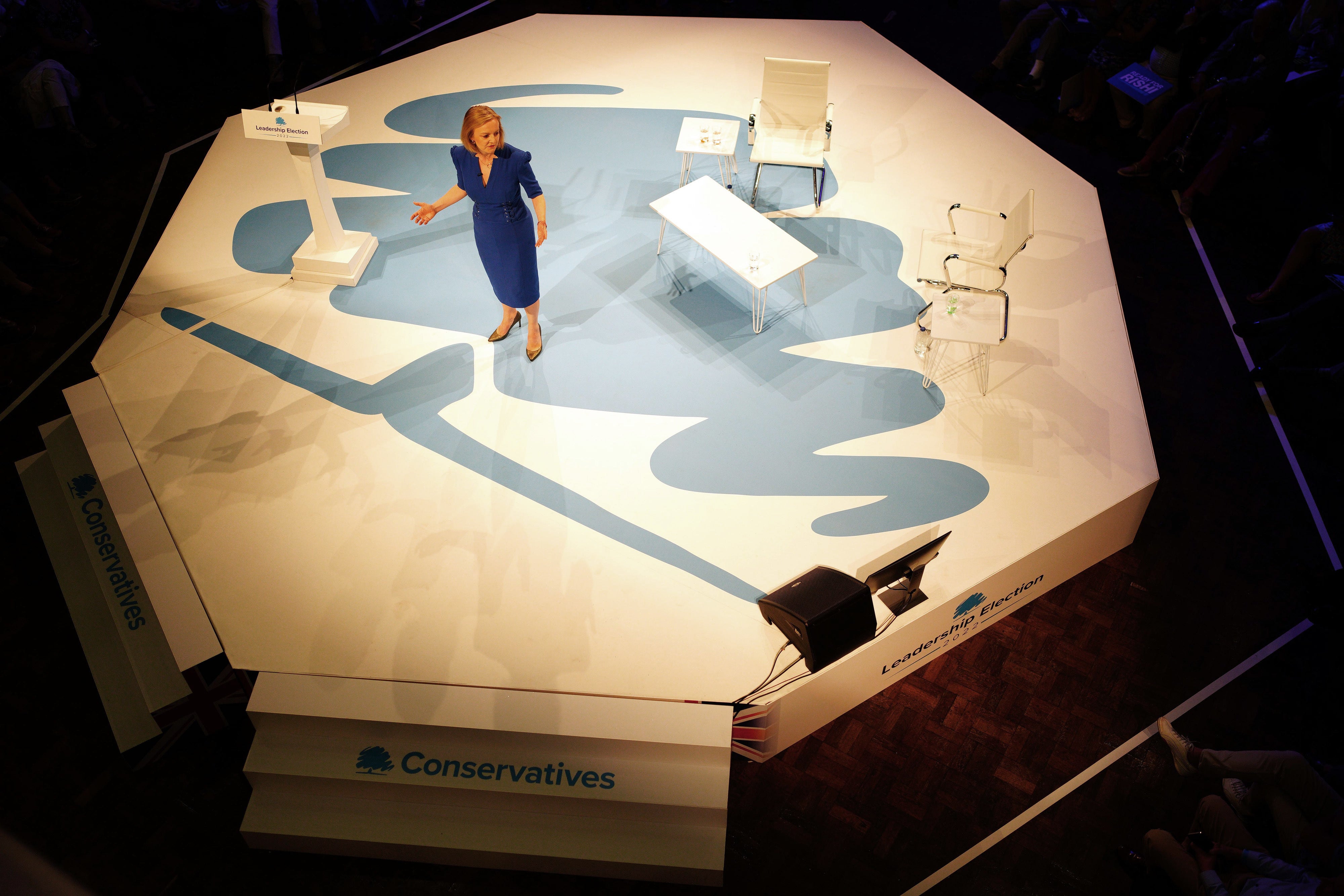
Truss explains her approach in simple terms; her allies point to polls showing she is viewed as more in touch with ordinary people. As one former minister told me: “Rishi’s default position is to talk about what he did as chancellor. But it can feel a bit negative and pessimistic. He wants to talk about his furlough scheme, but Liz just turns the spotlight to his tax rises.”
Such criticisms, and a sense that time was running out before ballot papers went out to Tory members from Monday, prompted a major rethink by Sunak. First, he promised to temporarily scrap VAT on domestic energy bills. Then he pledged a dramatic cut in income tax from 20p to 16p in the pound by the end of the next five-year parliament (due in 2029). Although he said this offered a “radical but realistic vision,” his plan seemed inconsistent with his initial caution on tax cuts and was inevitably branded a panicky U-turn by the Truss camp. With hindsight, it would have been better for Sunak to have announced his proposed tax cuts at the outset.
One weakness in Sunak’s blueprint is that, like Truss, he would rely on higher economic growth to balance the nation’s books. Yet there is no guarantee of such growth. While Truss would allow higher borrowing than her rival, both candidates are wary of talking about the other way to lower taxes – public spending cuts.
Some senior party figures regard Truss as high-risk option, believing she is a loose cannon. Such fears were justified on Tuesday when, in an embarrassing retreat, she abandoned a plan to cut £8.8bn from public sector wages by paying workers less outside London and the south-east after it was dubbed “levelling down.”
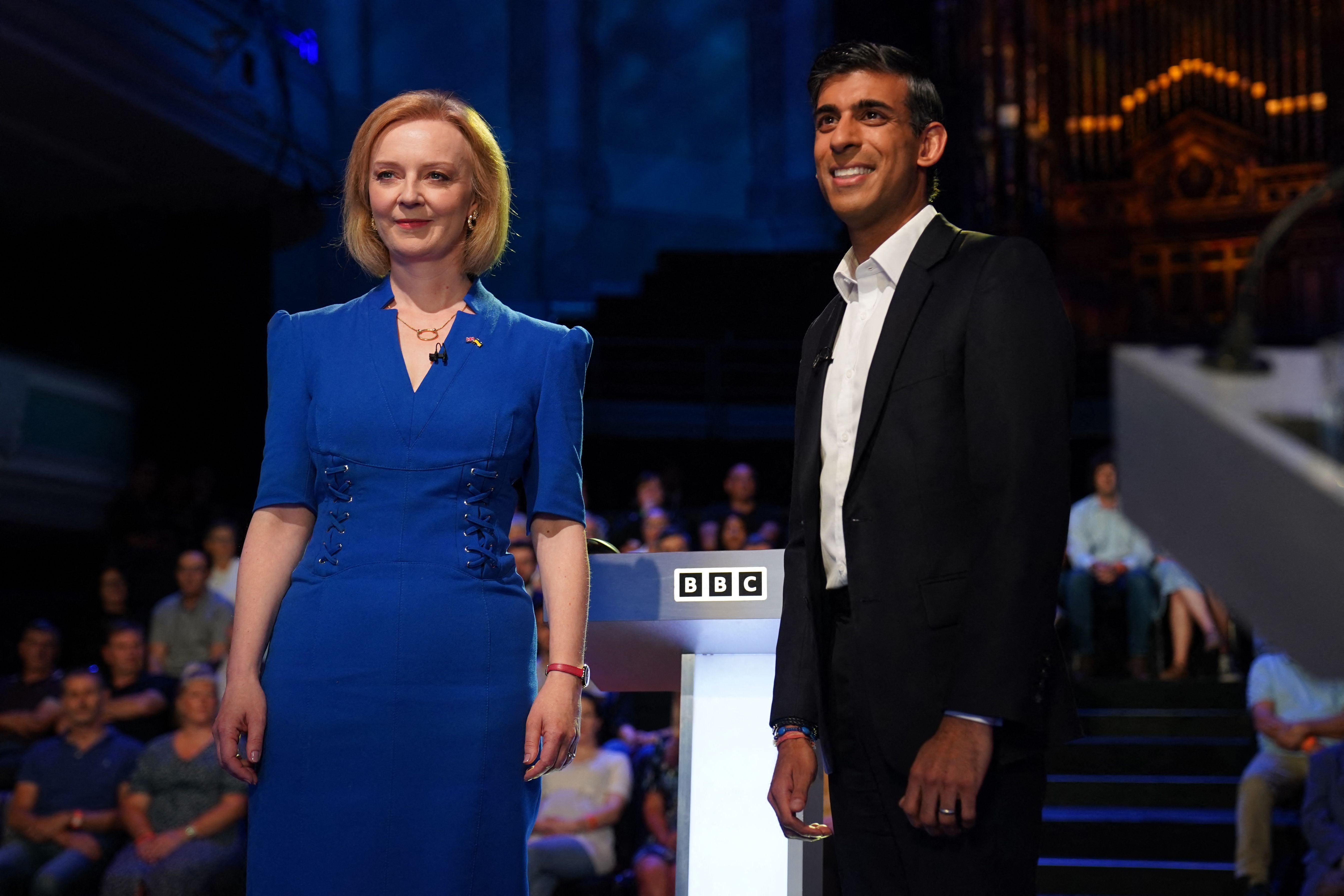
While Sunak’s spell at the Treasury offers Truss a big target and has set the agenda for this contest, he has little room to attack her on foreign policy. There have been skirmishes on China and Russia but not vast differences between them. Truss can strike a more hardline pose on EU relations after bringing in legislation allowing the UK to override key parts of the Northern Ireland protocol. Although Sunak warned the cabinet this could result in a damaging trade war, he knows the Tory membership is strongly pro-Brexit and has said he would press on with the Bill. The suspicion is that he would be more flexible than Truss and would try to re-set relations with the EU. But that is not a message the Tory grassroots wants to hear.
A perception the contest has become a race to the right has been fuelled by both candidates taking a tough line on immigration; they would press ahead with the controversial plan to deport some asylum-seekers to Rwanda, even though it has failed to get off the ground. It is a reminder that the choice for those selecting our next prime minister will be between two figures on the right. Bizarrely, both camps have branded each other “socialist” – Sunak for imposing “Gordon Brown levels” of tax and Truss for her proposed borrowing spree.
The wider public may rue the paucity of debate about public services; there is warm rhetoric about “reform” but it is usually vague. The incoming prime minister will be greeted with the cold reality of a record NHS waiting list of 6.6 million, an issue that wise Tory MPs (Sunak included) admit could cost the party the next general election. There has been little discussion of post-covid recovery in schools. Brief mentions of “net zero” are accompanied by another nod to the right: fracking would be allowed if local people support it. More housebuilding, the easiest supply side route to higher growth, appears off limits; nimbyism is alive and well among Tory activists. There is little recognition of the pressures facing social care, as ever the NHS’ poor relations, or the inevitable call on public funds from an ageing population. Perhaps that one is too close to home; four in 10 Tory members are over 65.
Those members must now make their big decision. But voters who do not share the two aspiring prime ministers’ desire to prioritise tax cuts over public services must wait for the genuine choice they will be offered at the next general election.




Join our commenting forum
Join thought-provoking conversations, follow other Independent readers and see their replies
65Comments